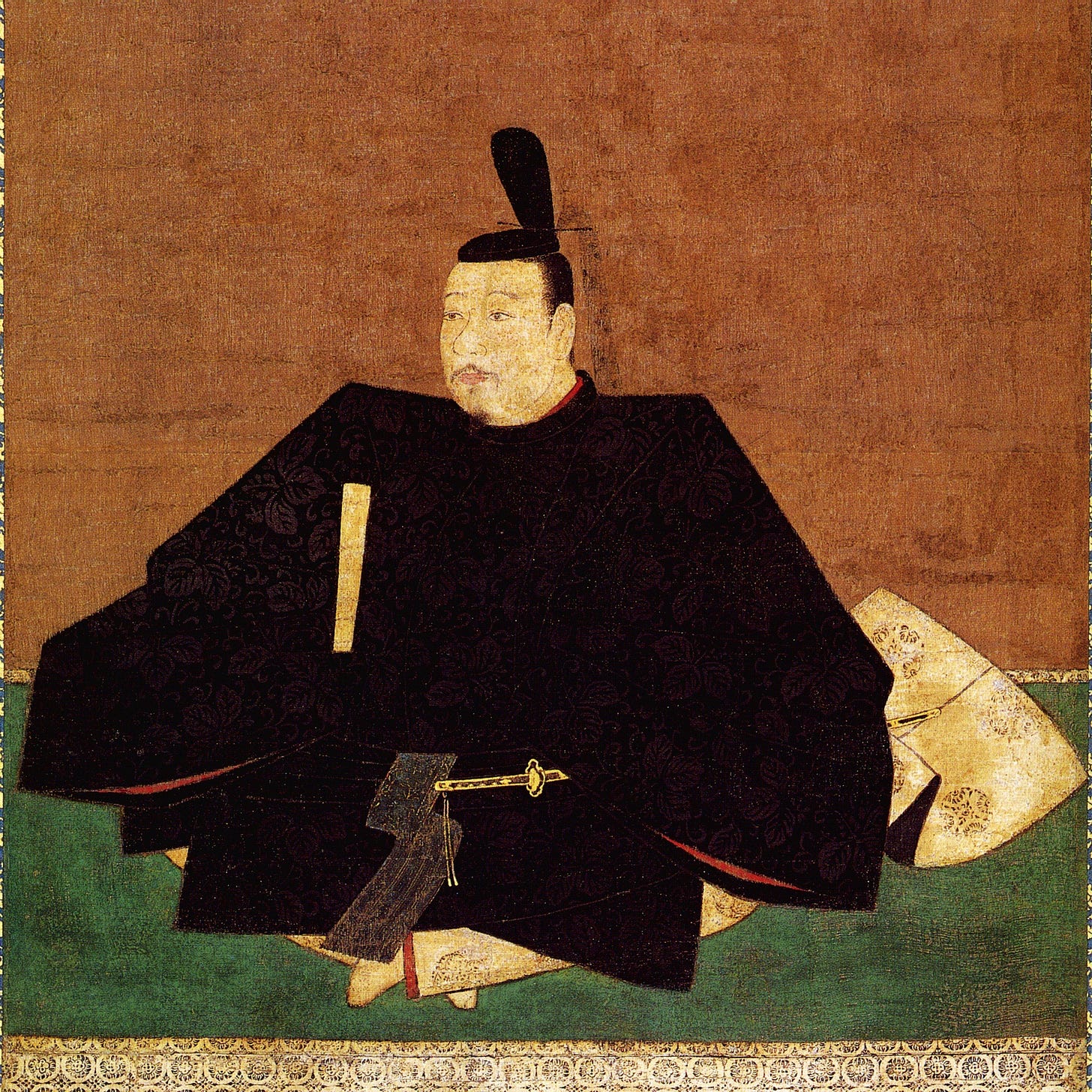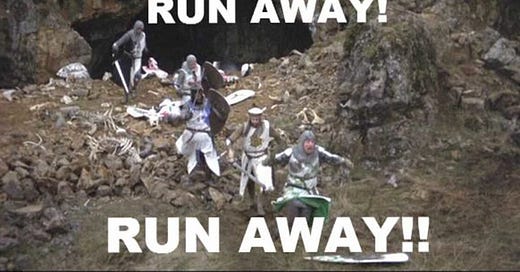
If you need to waste a few years of your life, you could do a lot worse than the website TV Tropes. It’s a collaboratively-edited collection of a vast range of literary tropes and devices, catalogued across all different kinds of media such as movies, anime, live-action TV, video games, and also occasionally ‘Real Life.’
One such trope I happened to be reading a few days ago was that of the Combat Pragmatist. This, basically, is the character who does not fight fair under any circumstances; he does what is needed to win, no matter how dirty or dishonorable that may be. The example used on the main page of TV Tropes is the famous scene in Raiders of the Lost Ark. You know the one - Indy is facing up to a sword-wielding bad guy across a crowded marketplace, and the audience gets ready for an extended and dramatic fight sequence. What actually happens, though, is that Indy simply pulls his gun and shoots the bad guy.

These Colors Don’t Run. Unless They Really Need To.
Anyway, in the “Real Life” section of the TV Tropes Combat Pragmatist page, we read this:
The reason why the Ninja were so successful as spies and assassins was their complete disregard for the code of honor that almost all warriors in Japan were expected to follow, as well as the social code that civilians followed. Ninja had no issue with running from fights, catching their enemy off guard, and using weapons disguised as farming or gardening implements. They also would disguise themselves as farmers, gardeners, and even geisha and prostitutes. A samurai would literally die before being seen dressed as anything other than a proper nobleman.
Woof. There’s a lot to unpack here. And if you listen carefully, you can probably hear the sound of academic historians banging their heads against the wall. But let’s just stick to the bolded bit, to the idea that samurai would not run from battle. This, if you believe the TV Tropes account, was a common military doctrine among Japanese warriors, and its widespread currency provided a tactical advantage that the historical shinobi could exploit.
The idea that samurai didn’t run is fairly widespread, I think. The ‘samurai’ character class in an indy 8-bit style RPG I played a few years back, Dungeons of Chaos, has as one of its class features that it can’t run away from a battle. If you move the character to the edge of the screen during combat, the option to flee simply doesn’t appear.
All of this raises one obvious question: is it true that medieval Japanese warriors regularly refused to retreat or flee from battle, in the interests of their ‘honor’?
No. Not even close.
There, that was easy. What’s for lunch?
Kusunoki Masashige: Not Stupid
Let me illustrate this point with a couple of examples from the careers of famous samurai. The first is this guy, Kusunoki Masashige:1
Masashige was a prominent warrior from the 14th century who fought for the Emperor Go-Daigo in his uprising against the Hōjō clan of Kamakura between 1331 and 1333. Most famously, Masashige holds his fortress at Akasaka with five hundred men against a Hōjō army that outnumbers him at least five hundred to one, in not dissimilar fashion to a medieval Japanese version of 300. Masashige repels several waves of attacks in creative fashion until he realizes that even his luck has to run out eventually, so he abandons his fortress and sneaks away. Here’s how Helen McCullough translates Masashige’s speech to his men in the medieval war tale Taiheiki:
“In divers battles of late have we overreached the foe, whose slain are beyond counting, but these things are as nothing in the eyes of so mighty a host. Moreover, the castle’s food is eaten up, and no other warriors will come to deliver us.
Assuredly I will not cherish life in the hour of need, that from the beginning have been steadfast in the defense for His Majesty’s sake, anticipating therein the warriors of the realm. But the true man of courage ‘is cautious in the face of difficulties, and deliberates before acting.’ I will flee this castle for a time, causing the enemy to believe that I have taken my life, so that they may go away rejoicing.”2
So Masashige and his men pile up a bunch of corpses to make it look like Masashige is dead, then burn down their fortress and sneak away from the besieging Hōjō troops. Masashige’s “I will not cherish life in the hour of need” means that he is not afraid to die if he absolutely has to, but he isn’t going to get himself killed just for the sake of some nebulous idea of honor. In fact, as Masashige himself remarks earlier to Go-Daigo:
“Not by opposing strength against strength will we triumph…Since the way of warfare is as it is, let not the sovereign look at the outcome of a single battle. While he hears that Masashige alone still lives, let him believe that he will prevail at last!”3
In other words, Masashige is playing the long game. It’s not about any one battle; rather, Masashige realizes that he needs to stay alive to lead the Imperial forces, and getting himself killed for the sake of it is just, well, stupid.
Ashikaga Takauji: No ‘Honor,’ No Problem
We might also look at the career of one of Masashige’s most implacable foes, the first Ashikaga Shogun Ashikaga Takauji.4

In 1335, dissatisfied with his reward for his performance in the overthrow of the Hōjō, Takauji rises up in the eastern city of Kamakura and declares against the Emperor Go-Daigo. On learning that the Emperor has sent an army against him, Takauji at first runs away and plans to surrender:
The assembled throng [of Takauji’s junior commanders] hammered furiously on the gate, at which someone came out and said, “The Shogun has fled to the Kenchō-ji Temple. He means to shave his head and become a monk. I and my fellows tried everything we could to dissuade him. He has cut off his topknot, but has not yet fully shaven his head.”5
Here he is running away again, being driven out of Kyoto in 1336:
Having received an erroneous report that Nitta Yoshisada and the other Loyalist commanders had all been killed and their troops had fled, Takauji divided up his forces in order to waylay [what he thought were the fleeing] Imperial troops. The Imperial army took advantage of this opening to come on the attack, and Takauji was defeated and fled to Tanba Province.6
Takauji also turns down - actually, flat-out ignores - a challenge to single combat from his arch-rival Nitta Yoshisada:
Yoshisada gripped his bow and nocked an arrow, calling upon Takauji to come out from the temple as he declared to him, “Too long has the realm been in chaos! Some may say that we fight over who is the true and legitimate Emperor, but this has always been about just you and me. Let us not make the common people suffer, all for the sake of a single man’s life - better instead for each man to ride forth unaided for one final battle, and settle once and for all who is the stronger. Here, let me make you a gift of an arrow!”
With this, Yoshisada fired off an arrow that pierced the temple gate and flew straight on into Takauji’s tent, but Takauji did not come out from the temple.7
Well then. With all this ‘dishonorable’ conduct, surely Takauji’s ability to lead and attract other warriors to his cause would be fatally impaired. Strict code of samurai conduct, and all that.
Uh, no.
In fact, after being driven out of Kyoto, Takauji regroups in Kyushu, comes back with a much stronger force at his back, and proceeds to hand Nitta Yoshisada’s imperial Loyalists their collective asses on several further occasions. All while founding a Shogunate that lasts for 250 years or so, too.
I want to be clear that it was trivially easy for me to find these examples, and if I really wanted to labor the point I could find dozens if not hundreds of other examples of warriors running away from battle. If you have some time on your hands, try going to any of the 22 chapters of the online text of the history I’m working with, Nihon gaishi, and using CTRL+F plus the graph 走 (meaning ‘to run away, or ‘cause to flee,’ depending on context) to see how often this comes up in the text. You will, I suspect, see my point, even if you can’t read Japanese or Chinese.
Society for Creative Anachronism, Japan Version
There are even accounts of warriors pretending to flee as a deliberate tactic, intending either to lure the pursuing enemy into an ambush or cause them to become complacent. Consider the case of the mid-16th century warlord Hōjō Ujiyasu:8
Some Uesugi forces came to meet him, but Ujiyasu did not engage them and fled back into the castle at Odawara. He then asked one of his spies, “What is the word amongst the enemy?”
The reply came, “They are all laughing at you, saying ‘The cur fled!’”
Ujiyasu remained where he was for five or six days, then went forth once again to the south bank of the Iruma River. When the enemy came, he fled again, then questioned his spy once more. The spy said, “The enemy is saying, ‘The cur surely cannot come forth yet again; and if he does, all he will do is flee. There is no need to pay him any further mind.’”
“Perfect!” said Ujiyasu.9
Clearly, for Ujiyasu, ‘honor’ was a distant second to, y’know, winning. Which he very shortly does, handing that particular branch of the Uesugi clan a defeat from which they never really recover.
Now, I don’t mean to suggest that medieval Japanese warriors considered running away to be desirable, or that warriors might not be temporarily embarrassed by doing so. As far as it’s possible to tell, the prevailing ethic on running away appears to have been in line with how ‘strategic retreats’ might be handled by any other military at almost any other point in history. You’d rather not, if you can avoid it, and it’s potentially embarrassing, but when you need to run away you do it, because allowing your armies to be destroyed for the sake of ‘honor’ is stupid. Yes, there are cases of warriors being laughed at or getting into trouble with their superiors for fleeing, but this is probably consistent with almost any other military culture anywhere in the world.
All of this raises an obvious question - if actual medieval warriors ran away all the time, then how did the mistaken idea that they didn’t do so get started? That’s what I’d like to consider in the next post, where I’ll also ask what all of this means for the widely-believed ‘samurai-ninja’ thing, and whether the concept of ‘ninja’ is necessary in the first place.
Kusunoki Masashige 楠木正成 (?-1336).
Helen McCullough, trans., The Taiheiki: A Chronicle of Medieval Japan (Columbia UP, 1959), pp. 89-90.
McCullough, Taiheiki, p. 69.
Ashikaga Takauji 足利尊氏 (1305-1358).
Nihon gaishi kōgi (Kōbunsha, 1932), 2:186. Kanbun text: 十二月。諸將還。詣尊氏第。第門閉矣。衆亂敲之。有一人出曰。將軍逃建長寺。欲削髮。我曹百方止之。切髻而未剔也。
Nihon gaishi kōgi 2:188. Kanbun: 謬聞義貞等死。其兵逃走也。分兵要之。官軍乘虛來攻。尊氏敗走丹波。
Nihon gaishi kōgi 2:122. Kanbun: 執弓注矢。呼尊氏。語之曰。天下擾亂久矣。雖曰皇統之爭。抑由公與義貞而已。與其爲一身苦萬民。寧各以單騎決鬬。決雌雄。請送一箭。箭軼門樓。入尊氏帳中。尊氏不出。
Hōjō Ujiyasu 北条氏康 (1515-1571).
Nihon gaishi kōgi 2:446-7. Kanbun: 上杉氏兵來迎。氏康不戰而走。入小田原。問諜者曰。敵中云何。對曰。敵皆笑曰。豎子走矣。居五六日。又出至河南。敵來。又走。又問諜者。諜者曰。敵曰。豎子不能復出。卽出。走耳。莫復顧也。氏康曰。可矣。






Awesome read. And I love TV Tropes but their strength is definitely in fiction/storytelling.